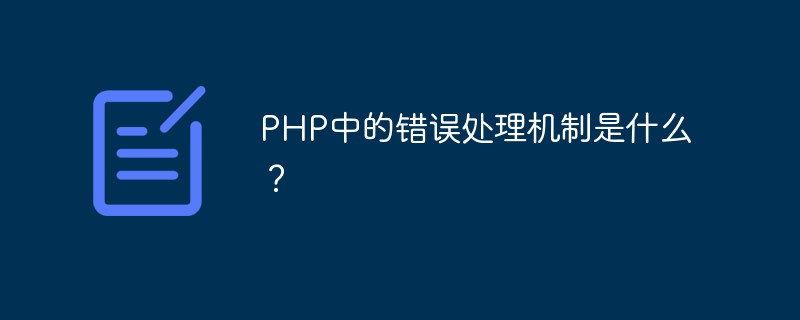Using exception handling can enhance the robustness of PHP code. The specific steps are as follows: Create a custom exception class to map specific errors. Use throw to throw exceptions to handle errors. Use try-catch statements to catch exceptions and handle them appropriately.

A guide to using exceptions in PHP to improve code robustness
Exception handling is a key programming mechanism that can help you build More robust and maintainable code. In PHP, exceptions are objects used to handle errors and unusual situations. By using exceptions, you can handle errors gracefully, avoid unexpected program termination, and provide valuable information about the nature of the problem.
Step 1: Create an exception class
First, you need to create a custom exception class to represent a specific error or exception condition in your code. Custom exception classes should inherit PHP’s Exception class. Here is an example:
class MyException extends Exception
{
public function __construct($message, $code = 0, Exception $previous = null)
{
parent::__construct($message, $code, $previous);
}
}Step 2: Throw an exception
When your code encounters an error or unusual condition, you can use throw Keyword throws exception. Here's how to throw a custom exception in a function:
function doSomething()
{
if ($someCondition) {
throw new MyException('Something went wrong.');
}
}Step 3: Catch the exception
To catch the exception, use try-catch statement. The try block contains the code that may go wrong, and the catch block specifies how to handle the exception:
try {
doSomething();
} catch (MyException $e) {
// 处理 MyException 异常
} catch (Exception $e) {
// 处理所有其他异常
}Practical case
Assume that you I'm using PHP to parse a JSON string and want to gracefully handle errors when parsing fails. Here's how to handle this scenario using exceptions:
try {
$data = json_decode($jsonString);
if ($data === null) {
throw new MyException('Invalid JSON string.');
}
} catch (MyException $e) {
// 处理解析失败
echo 'Error: ' . $e->getMessage();
}By using exceptions, you can easily handle errors and exceptions in your PHP code, making it more robust and maintainable.
The above is the detailed content of How to use exceptions in PHP to improve code robustness?. For more information, please follow other related articles on the PHP Chinese website!
 PHP中API如何处理异常处理和重试机制Jun 17, 2023 pm 03:52 PM
PHP中API如何处理异常处理和重试机制Jun 17, 2023 pm 03:52 PMPHP中API如何处理异常处理和重试机制在PHP中,API已经成为许多网站和应用程序的核心,因为它们提供各种功能和功能。然而,在使用API时,我们经常会遇到许多问题,如网络连接问题,响应超时,无效请求等。在这种情况下,我们需要了解如何处理异常和重试机制来确保我们的应用程序的可靠性和稳定性。异常处理在PHP中,异常处理是一种更加优雅和可读的错误处
 PHP中的错误处理机制是什么?May 12, 2023 pm 07:31 PM
PHP中的错误处理机制是什么?May 12, 2023 pm 07:31 PMPHP是一种流行而强大的服务器端编程语言,可以用来开发各种Web应用程序。就像其他编程语言一样,PHP也有可能会出现错误和异常。这些错误和异常可能由各种原因引起,如程序错误、服务器错误、用户输入错误等等。为了确保程序的运行稳定性和可靠性,PHP提供了一套完整的错误处理机制。PHP错误处理机制的基本思想是:当发生错误时,程序会停止执行并输出一条错误消息。我们可
 Go语言框架开发中的异常处理与错误码设计Jun 05, 2023 pm 09:21 PM
Go语言框架开发中的异常处理与错误码设计Jun 05, 2023 pm 09:21 PM随着互联网技术的不断发展,越来越多的企业开始使用Go语言进行开发。Go语言以其高效、稳定、易用的特点备受开发者的青睐。在企业级开发中,框架是不可或缺的一部分。因此,本文将介绍在Go语言框架开发中,如何进行异常处理与错误码设计。一、什么是异常处理在计算机编程中,异常处理指的是当程序运行过程中出现异常情况时,程序必须采取的措施。这些异常情况包括硬件故障、软件缺陷
 Swoole实现高效的异常处理机制Jun 14, 2023 pm 03:54 PM
Swoole实现高效的异常处理机制Jun 14, 2023 pm 03:54 PM随着Web开发技术的不断发展,开发人员也面临着越来越复杂的业务场景和需求。例如,高并发、大量请求处理、异步任务处理等问题都需要使用高性能的工具和技术来解决。在这种情况下,Swoole成为了一种越来越重要的解决方案。Swoole是一种基于PHP语言的高性能异步网络通信框架。它提供了一些非常有用的功能和特性,例如异步IO、协程、进程管理、定时器和异步客户端,使得
 如何在ThinkPHP6中进行异常处理?Jun 12, 2023 am 08:54 AM
如何在ThinkPHP6中进行异常处理?Jun 12, 2023 am 08:54 AMThinkPHP6是一款非常流行的PHP框架,已经被广泛应用于各种Web应用程序中。在开发过程中,可能会遇到各种异常,如果不及时处理,就会导致程序无法正常运行。本文将介绍如何在ThinkPHP6中进行异常处理,保证Web应用程序的稳定性和可靠性。异常处理的概念异常处理是指在程序正常执行过程中,遇到错误或意外情况时所进行的处理。在开发Web应用程序时,常常会发
 PHP实现数据库集群异常处理的方法May 15, 2023 pm 02:40 PM
PHP实现数据库集群异常处理的方法May 15, 2023 pm 02:40 PM随着互联网的不断发展,越来越多的企业和组织开始规划数据库集群来满足其数据处理需求。数据库集群可能包含数百甚至数千个节点,因此在节点之间确保数据同步和协调非常重要。在该环境下,存在着很多的异常情况,如单节点故障,网络分区,数据同步错误等,并且需要实现实时检测和处理。本文将介绍如何使用PHP实现数据库集群异常处理。数据库集群的概述在数据库集群中,一个单独的
 Java中的异常处理Jun 15, 2023 pm 11:16 PM
Java中的异常处理Jun 15, 2023 pm 11:16 PMJava是一种面向对象的程序设计语言,由于其很高的稳定性和安全性,成为了一种广泛应用的编程语言。然而,在程序开发过程中,异常总是不可避免的问题。由于Java语言天生具有处理异常的功能,因此它可以通过异常处理机制来避免程序崩溃,保证程序的正常运行。一、Java中的异常概述在Java中,异常是指程序发生了不正常的情况,如数组越界、除数为零、文件未找到等等。但是这
 Yii框架中的错误页面与异常处理Jun 21, 2023 pm 03:27 PM
Yii框架中的错误页面与异常处理Jun 21, 2023 pm 03:27 PMYii框架是一款广泛应用于Web应用程序开发的高性能PHP框架。在Yii的应用程序中,错误页面和异常处理模块是非常重要的功能之一。本文将简要介绍Yii框架中的错误页面和异常处理模块,并提供一些实用的示例代码,以帮助您更好地理解和使用这些功能。一、错误页面当用户访问一个不存在的页面、发生了错误的连接或者其他错误时,Yii框架会默认显示一个错误页面。这个页面通常


Hot AI Tools

Undresser.AI Undress
AI-powered app for creating realistic nude photos

AI Clothes Remover
Online AI tool for removing clothes from photos.

Undress AI Tool
Undress images for free

Clothoff.io
AI clothes remover

AI Hentai Generator
Generate AI Hentai for free.

Hot Article

Hot Tools

Safe Exam Browser
Safe Exam Browser is a secure browser environment for taking online exams securely. This software turns any computer into a secure workstation. It controls access to any utility and prevents students from using unauthorized resources.

ZendStudio 13.5.1 Mac
Powerful PHP integrated development environment

SublimeText3 English version
Recommended: Win version, supports code prompts!

Zend Studio 13.0.1
Powerful PHP integrated development environment

Dreamweaver CS6
Visual web development tools






